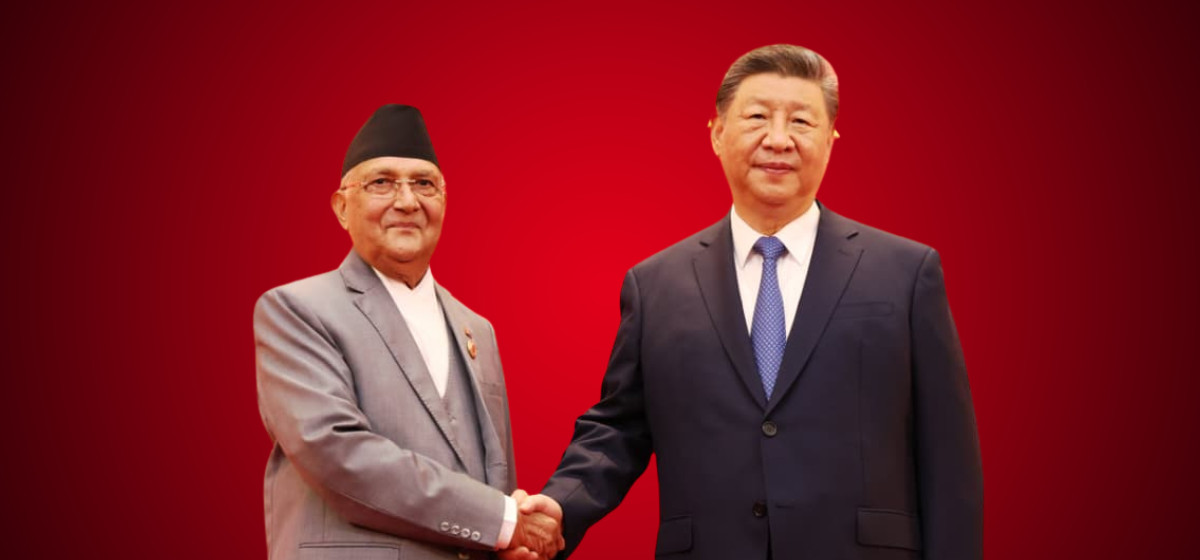KATHMANDU, Aug 31: The Lipulekh border dispute remains one of Nepal’s most delicate geopolitical challenges, shaping its relations with both India and China. While Nepal has sought to resolve the matter through dialogue, experts warn that careful and courteous diplomacy is crucial as Prime Minister KP Sharma Oli visits China from Saturday.
This will be Oli’s second visit to Beijing during his current tenure, where he will participate in the Shanghai Cooperation Organization (SCO) summit at the invitation of Chinese President Xi Jinping. Although the trip is primarily focused on multilateral engagements, it is also expected to provide a platform to raise Nepal’s concerns over Lipulekh.
Oli will address the SCO Plus Summit in Tianjin on Monday and attend China’s commemoration of the 80th anniversary of its war against Japanese aggression on Wednesday. According to the Ministry of Foreign Affairs, he will also hold bilateral meetings with several world leaders, including President Xi and possibly Indian Prime Minister Narendra Modi on the sidelines of the summit.
Former Foreign Minister Pradeep Gyawali stressed that Nepal must maintain clarity on Lipulekh while actively engaging with regional and multilateral platforms. “We sent a diplomatic note to China in 2015. Talks were also held with India, but India has not accepted Nepal’s claim,” Gyawali said. “We must protect our territory through transparent dialogue and establish mechanisms to resolve disputes.”
Gyawali underlined the importance of raising the issue with both neighbors without letting it overshadow broader cooperation. “We must state our disagreements clearly while keeping communication channels open,” he said.
Will Major General Pandey step down amid age dispute?

Foreign policy scholar Dr. Rupak Sapkota argued that Nepal should rely on historical treaties, including the 1816 Sugauli Treaty, as well as maps and past agreements with China to strengthen its position. He criticised India and China for signing agreements to use Lipulekh as a trade route without Nepal’s consent.
“This undermines Nepal’s sovereignty and contradicts the UN Charter,” Sapkota said. He added that while bilateral dialogue with India should remain the first option, Nepal must also be prepared to internationalise the issue if necessary.
Sapkota pointed out that China’s support for Nepal’s sovereignty appears inconsistent given its trade pact with India through Lipulekh. “This contradiction needs to be addressed through direct dialogue,” he said.
The Lipulekh issue dates back to the Sugauli Treaty between Nepal and the British East India Company, which placed territories east of the Kali River under Nepal. Nepal identifies the river’s source at Limpiyadhura, encompassing Kalapani and Lipulekh.
Border expert Buddhi Narayan Shrestha argued that establishing trilateral points at both eastern and western junctions—where Nepal, India, and China converge—could resolve the dispute. “Historical maps clearly show the Kali River originating from Limpiyadhura, which validates Nepal’s claim,” he said.
Shrestha urged Prime Minister Oli to raise the matter with both Xi and Modi. “Nepal must assert its sovereignty while seeking a high-level trilateral mechanism to formalise border demarcation,” he said.
India considers Lipulekh part of Uttarakhand’s Pithoragarh district and has rejected Nepal’s updated 2020 map. It views Kalapani as strategically significant due to its proximity to the tri-junction with China. While China has claimed neutrality, its trade pact with India through Lipulekh has fuelled concerns in Nepal.
Meanwhile, geopolitical shifts—including growing India–China cooperation in trade—have complicated Nepal’s efforts.
Nepal and the SCO
Nepal currently holds dialogue partner status in the SCO. Experts say Oli’s participation offers an opportunity to broaden Nepal’s diplomatic space.
“Given the growing influence of powers like China, Russia, India, and Iran in the SCO, Nepal should pursue at least observer status, if not full membership,” Gyawali said. He described the forum as one that promotes coexistence and security rather than a military alliance.
Dr. Sapkota agreed, noting that full membership would enhance Nepal’s regional and global presence. “In a multipolar world, active engagement in forums like the SCO is vital to strengthen Nepal’s strategic and political standing,” he said.



































